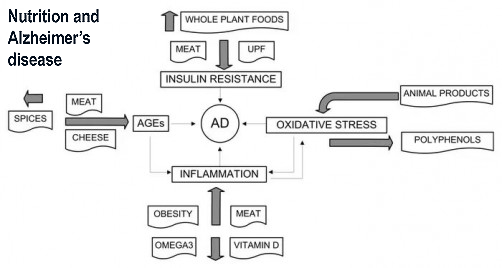Meat-heavy diet raises risk for Alzheimer's disease, study finds
Study predicts U.S. cases of the disease will grow 50 percent by 2038
-----
Americans' meat-rich diets make them more vulnerable to Alzheimer's disease, according to a study published in the peer-reviewed Journal of Alzheimer's Disease. "Diets that are more plant-based, like the Mediterranean diet and traditional diets in China, Japan, and India, are shown to reduce risk, especially when compared to the Western diet," says a press release about the study by nutrition scientists.
"Alzheimer’s disease rates rise in these countries as they make the nutrition transition to the Western diet," the release notes. "This study identifies dementia risk factors including higher consumption of saturated fats, meat (especially red meat such as hamburgers and barbeque) as well as processed meats such as hot dogs, and ultra-processed foods high in sugar and refined grains.
The study also helps explain why certain foods increase or reduce the risk of Alzheimer’s. "Meat raised risk of dementia the most by increasing risk factors such as inflammation, insulin resistance, oxidative stress, saturated fat, advanced glycation end products, and trimethylamine N-oxide," the release says. The study identified several foods that protect against Alzheimer’s, such as nuts, omega-3 fatty acids, whole grains, green leafy vegetables, colorful fruits and vegetables, and beans and other legumes (plants that fix nitrogen).
Ultra-processed foods can increase the risk of obesity and diabetes because they lack the ingredients found in whole plant foods that deter dementia away, such as anti-inflammatory components and antioxidants. Ultra-processed foods make poverty is an important driver of Alzheimer’s disease, because they are usually cheaper sources of energy than fruits, vegetables, whole grains, and other more nutritious foods.
"The paper also suggests that Alzheimer’s disease rates in the U.S. are projected to increase by 50% from 2018 levels by 2038," the release saus. "This calculation is based on comparing trends of obesity in the U.S. with Alzheimer’s disease trends. This comparison shows a 20-year lag between obesity rates and Alzheimer’s disease rates. This estimate is very close to the estimate published by the Alzheimer’s Association in 2018, an estimate of a 56% increase."
The researchers said, "Our estimate suggests that the rising trend of obesity, due to consumption of meat and ultra-processed foods, is the force driving dementia. Although our personal risk of Alzheimer’s disease can be reduced with diet, it is expected that those who continue to eat the Western diet will continue to have a higher risk."
The study, a review of other published research, was conducted by Steven Blake of the Maui Memory Clinic in Hawaii and William Grant of San Francisco's Sunlight, Nutrition and Research Center. It was endorsed by other experts.
“Grant and Blake comprehensively review and synthesize the role of dietary factors in Alzheimer’s disease,” said Dr. Edward Giovannucci, a professor of utrition and epidemiology at Harvard University. “Evidence from diverse perspectives support that a diet that emphasizes fruits, vegetables, legumes, nuts, whole grains, and … de-emphasizes meat, especially red meat, saturated fats, and ultra-processed foods is associated with lower risk of Alzheimer’s disease. Physical inactivity and obesity also contribute to higher risk.”
-----
Posted by Al Cross; Kentucky Health News is an independent news service of the Institute for Rural Journalism and Community Issues, based in the School of Journalism and Media at the University of Kentucky, with support from the Foundation for a Healthy Kentucky.



























